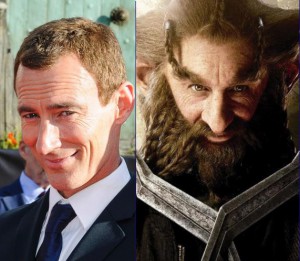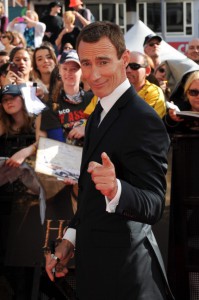 At the start of the summer, TORn staffer greendragon had the chance to continue her series ‘Inside the Middle-earth actor’s studio’ – discussing the craft of acting (and other things!) with cast members from The Hobbit and The Lord of the Rings movies. This time she sat down with an actor who has been involved since the beginning of Peter Jackson’s Middle-earth films – the fabulous Jed Brophy. To celebrate the release of TORn’s new book Middle-earth Madness, which features this and other interviews, here’s your chance to read what Brophy had to say.
At the start of the summer, TORn staffer greendragon had the chance to continue her series ‘Inside the Middle-earth actor’s studio’ – discussing the craft of acting (and other things!) with cast members from The Hobbit and The Lord of the Rings movies. This time she sat down with an actor who has been involved since the beginning of Peter Jackson’s Middle-earth films – the fabulous Jed Brophy. To celebrate the release of TORn’s new book Middle-earth Madness, which features this and other interviews, here’s your chance to read what Brophy had to say.
This is the third and final part of a long interview; you can find Part One here and Part Two here.
greendragon: The film you talked about – The Dead Room – when does that come out? Does it have a release date?
JB: It depends on the distribution deal that the director can get. The hardest thing about making films in New Zealand isn’t the making them; it’s finding someone to sell them overseas. [Director Jason Stutter] is a film maker whose last film had quite a big budget, and had a good cast, with Jemaine Clements playing one of the leads in it, but they struggled to find a distributor who liked that particular genre. The reason he’s making the horror film is because it’s a very popular genre and he likes it, so… I mean, I’m hoping it will come out before the end of the year, but that stuff’s out of my hands.
There’s another film I did called The Ballad of Maddog Quinn – with Little Dragon Pictures. We shot the last twenty minutes of a feature film, as a trailer to raise the money to shoot the rest of the feature over the summer. It’s become the new phenomenon in film making – crowd funding. It gives you a lot more autonomy to make the film that you want to make. As soon as you sign up with a studio, there’s a compromise that you have to make, in terms of making a film that they like, as well as a film that still has a semblance of the film that you started out making! It doesn’t really matter where you are in the world, or who you are; you know, Spielberg still complains about the fact that he struggles to find autonomy as a film maker! You would think, given the success that he’s had in his career, that studios would just leave him alone; but that’s simply not the case. But when you come up with the money for a film, I guess there’s a feeling of having ownership and putting your stamp on it – and marketing it to fit into the kind of films that you want to make. You can do it by crowd funding; or you can do it with a low budget, like Taika Waititi’s just done with What We Do in the Shadows – the vampire film that he’s made with Jemaine. You get it closer to the idea that you came up with; whether it’s a good idea or a bad idea, it’s still the idea that you wanted to film! The Dead Room and Maddog Quinn are on that model of being what we would call micro budgets: everyone got paid a limited amount; we all have points in the film, if it sells; but I think we all knew that we were making something that we could be proud of, regardless. Hopefully people will get to see it!
GD: We hope so! My final question for you today is, do you enjoy the fan base associated with The Hobbit and The Lord of the Rings films? It is an extraordinary fan base, and can sometimes be a slightly obsessive and possessive fan base – which I would imagine can be a bit overwhelming?
JB: I do generally enjoy it! I have had to be a little stern with some people! I think the thing that I don’t enjoy about some of the people in the fan base is when there is an elite snobbery about what you should know about Tolkien. I know quite a lot about him; and having been friends with Royd [Tolkien, The Professor’s great-grandson] I know stuff that most other people probably wouldn’t. But I believe that your fandom should be whatever you want to make it; as long as you’re passionate about what the stories are, it doesn’t really matter how many of the books you’ve read! I mean, I’m obsessive like that myself, but I don’t feel an ownership over characters from other films; and it’s been the weirdest thing – it’s only really been in the last year that I’ve had to say to a couple of people, “Hey, you know what? It is just a film! It’s a film that we all love and it’s based on books that we all love, but it is just Peter’s vision of that! I don’t think he was setting out to destroy Tolkien’s name by changing that particular part of the film!” It’s interesting – Royd truly believes that his great-grandfather would be chuffed, that there are so many people who are now enjoying his work because of the films. They’ve gone back and read the books, and gone, ‘Wow I really like the book as well!’ I think it’s a positive thing.
 But there’s no fan base like the Tolkien fan base! Star Trek’s got a huge fan base; Star Wars has a huge fan base; but the Tolkien fan base is something that’s based on an amazing piece of literature first and foremost, which has been turned into a whole lot of other things. That fan base for the literature was there for a long, long time before the films were made; and I don’t think that you can say the same for those other two franchises. Star Trek and Star Wars came out of films and out of television; but something which comes out of literature has a depth to it. There are a lot of artists, a lot of writers and a lot of other people in industries… opera, for example; there are a lot of things that it translates to, and that we can see in our own lives – and that are reinvigorated in that passion by watching the films. That’s what makes it unique.
But there’s no fan base like the Tolkien fan base! Star Trek’s got a huge fan base; Star Wars has a huge fan base; but the Tolkien fan base is something that’s based on an amazing piece of literature first and foremost, which has been turned into a whole lot of other things. That fan base for the literature was there for a long, long time before the films were made; and I don’t think that you can say the same for those other two franchises. Star Trek and Star Wars came out of films and out of television; but something which comes out of literature has a depth to it. There are a lot of artists, a lot of writers and a lot of other people in industries… opera, for example; there are a lot of things that it translates to, and that we can see in our own lives – and that are reinvigorated in that passion by watching the films. That’s what makes it unique.
I feel privileged to be part of these films. I didn’t ever imagine it would happen; it’s not something you’d ever think would be on your CV! Certainly I’ve got to do a lot of travel because of it, and I’m very thankful for that. I got to have a great trip with my son this year which I don’t think I would have done, otherwise. From that point of view, it’s been an amazing journey.
GD: So although some fans may get a little carried away about things they dislike in the films, or whatever their own particular slant is, do you find generally that they are respectful of your space as a human being?
JB: They are. I mean, there’s always the exception that proves the rule! There’s always the one person to whom you have to say, “You need to go away now…” [laughs] There’s always one; you say, “Look, I’ve given you three hours of my time; I really need to go!” There’s always going to be that; I’ve had that with theatre! I was doing a theatre show, and there was a woman who came to all eight major territories that we did here in New Zealand, and followed us overseas. She was passionate about the play, she was passionate about the characters in it. That’s great; but I did actually have to say to her, “Do you not have a job? You seem to be here every night! What do you do to support your habit…?” [laughs] I guess you could say the one thing that some of the fans, especially of Middle-earth, do have is – they spend a LOT of money travelling to see their favourite people! And I do worry that at the end of it, they may be financially crippled… I do worry for some of them.
It’s hard too, because the people who run the conventions have certain rules; they don’t want you to have lots of photos with people outside of the photo opportunities. But I’m always happy to do a sneaky one for people! I think it costs very little to make someone’s day; and I don’t mean that in a cheesy way, that we should go around thinking, ‘Wow, we’re doing this great thing because we’re helping people!’ But there is a certain percentage of people who have found that the Tolkien literature, and films particularly, have helped siblings, and children, and people that they know with learning disabilities and all sorts of things… That, to me, I think, is one of the best things about the fandom; there are genuinely people out there for whom it’s been a life saver. They’ve found a community that they belong to.
As a performer, you don’t often get to touch people in a way that has an emotional reality to it. There’s a play I did years ago called Skin Tight, which is a love story, which we toured for ten years; and someone said to me, “Why are you still doing that play?” And I said, “Because every single night, there are people in the audience who are touched in a way that they want to go and find this level of love for themselves…” We do a lot that’s just pure fluff; we do a lot that’s pure entertainment. There are a lot of CGI films out there where I couldn’t tell you what they’re even about – they just were a lot of explosions and people running around screaming, and a lot of flesh! But what do they actually do for people’s psyches? What do they actually do for them in a holistic way? Not an awful lot!
 These [Middle-earth] films, for whatever reason, and these books, and the art attached to them, and the weaving, the artistry, attached to it, all of those things, have a real depth and integrity which comes from the man himself – from Tolkien. I think it all starts there. If he were a lesser person, and a lesser writer, we wouldn’t be having this discussion today. I think he was a very generous person, in terms of allowing this part of his psyche to be transferred into a book, and to be made so popular; and it was great that Peter Jackson was allowed to make them into films; not just for the people who were lovers of the book, but for New Zealand as whole! People look at our country now as more than just a bunch of rugby players or sheep! There’s a wealth of artistry here that’s sprung up around WETA and the support people for those films that has been a major positive for our country, and for the people involved.
These [Middle-earth] films, for whatever reason, and these books, and the art attached to them, and the weaving, the artistry, attached to it, all of those things, have a real depth and integrity which comes from the man himself – from Tolkien. I think it all starts there. If he were a lesser person, and a lesser writer, we wouldn’t be having this discussion today. I think he was a very generous person, in terms of allowing this part of his psyche to be transferred into a book, and to be made so popular; and it was great that Peter Jackson was allowed to make them into films; not just for the people who were lovers of the book, but for New Zealand as whole! People look at our country now as more than just a bunch of rugby players or sheep! There’s a wealth of artistry here that’s sprung up around WETA and the support people for those films that has been a major positive for our country, and for the people involved.
And we meet artists overseas; I am in awe of some of the stuff that people bring up for me to sign, that they’ve done themselves! I’m like, “Why are you not doing this for a living?!” And often Richard [Taylor] and other people who are involved, and websites and support things around that, give people a way of channeling their talent into something which makes them feel positive about themselves. I think it’s an amazing thing. I think there’s a generosity of spirit which comes with these projects; and which the fans bring, as well. And I think TheOneRing.net does a lot of good in terms of creating that community spirit!
GD: I hope we do; we work hard at trying to! It’s been great chatting with you, Jed; many thanks for giving so much of your time!
JB: You’re welcome. As Ian McKellen said to all of us, “We’re a part of history!” It’s an amazing thing. Long may it continue!


